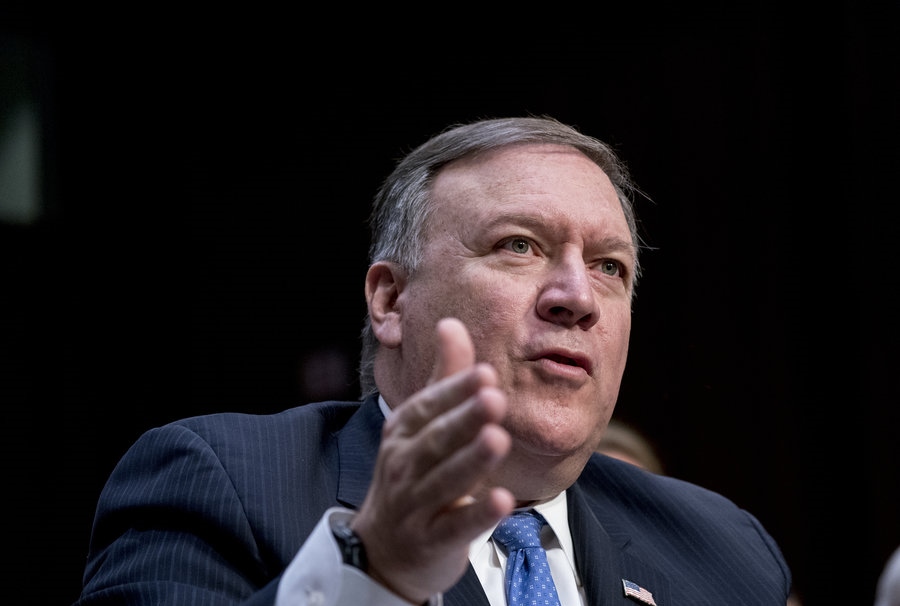US makes demands of Iran
May 22, 2018 | Expert Insights

US Secretary of State Mike Pompeo in a recent speech has threatened Iran with “the strongest sanctions in history” if the nation does not comply with 12 demands put forth by the US. Experts believe that this speech signals a new US policy that seeks a regime change in Iran.
Background
Iran’s nuclear program has been a source of concern for the international community. During the International Atomic Energy Agency’s (IAEA) investigations in the country, it was revealed that Iran had not declared a number of its nuclear activities and was not in compliance with the Non-Proliferation Treaty. In 2006, the country also refused to suspend its uranium enrichment program. The United Nations consequently imposed a number of sanctions on the nation.
By 2015, Iran had lost billions of dollars due to these sanctions; an estimated $100 billion in oil revenue alone. It had also lost out on Foreign Direct Investment. In July 2015, Iran agreed to sign a nuclear agreement (the Joint Comprehensive Plan of Action or JCPOA) with major powers Britain, China, France, Germany, Russia, and the United States (the P5+1). According to the JCPOA, Iran would limit its nuclear ambitions in return for relief from a number of sanctions for at least 10 years. The IAEA declared that Iran had complied with the terms of the provisional agreement and sanctions were lifted in 2016.
On May 8th, 2018, President Trump withdrew the US from the nuclear deal. This move was taken against the advice of allies such as France and Germany, whose leaders lobbied for the Trump administration to preserve the deal.
Analysis
US sanctions on Iran
US Treasury announced sanctions against UAE-based individuals and companies that were allegedly part of a financial network smuggling billions of dollars to Iran’s Revolutionary Guards elite Quds Force (IRGC-QF). Sanctions have also targeted Iran’s central bank for allegedly helping the IRGC-QF funnel millions of dollars to Hezbollah, a Lebanese militant group which US and Israel consider a terrorist organisation. Central bank governor Valiollah Seif and another official Ali Tarzali have been named “specially designated global terrorists”.
Mike Pompeo, the US Secretary of State, has now noted that the US will aim to "crush" Iran with economic and military pressure unless it changes its behavior in the Middle East. Experts now believe that the speech indicates that the US policy has now shifted towards seeking a regime change in Iran.
“The Iranian regime should know this is just the beginning,” Pompeo said. “I can’t put a timeline on it, but at the end of the day, the Iranian people will decide the timeline,” Pompeo said at the Heritage Foundation, a conservative thinktank in Washington. “The Iranian people will get to make a choice about their leadership. If they make the decision quickly that will be wonderful. If they choose not to do so, we will stay hard at this until we achieve the outcomes that I set forth.”
He also outlined 12 conditions required of Iran before any "new deal" will be made with the country. They are:
1) Iran must declare to the IAEA a full account of the prior military dimensions of its nuclear program, and permanently and verifiably abandon such work in perpetuity.
2) Iran must stop enrichment and never pursue plutonium reprocessing. This includes closing its heavy water reactor.
3) Iran must also provide the IAEA with unqualified access to all sites throughout the entire country.
4) Iran must end its proliferation of ballistic missiles and halt further launching or development of nuclear-capable missile systems.
5) Iran must release all U.S. citizens, as well as citizens of our partners and allies, each of them detained on spurious charges.
6) Iran must end support to Middle East terrorist groups, including Lebanese Hizballah, Hamas, and the Palestinian Islamic Jihad.
7) Iran must respect the sovereignty of the Iraqi Government and permit the disarming, demobilization, and reintegration of Shia militias.
8) Iran must also end its military support for the Houthi militia and work towards a peaceful political settlement in Yemen.
9) Iran must withdraw all forces under Iranian command throughout the entirety of Syria.
10) Iran must end support for the Taliban and other terrorists in Afghanistan and the region, and cease harboring senior al-Qaida leaders.
11) Iran must end the IRG Quds Force’s support for terrorists and militant partners around the world.
12) Iran must end its threatening behavior against its neighbors – many of whom are US allies. This includes its threats to destroy Israel, and its firing of missiles into Saudi Arabia and the United Arab Emirates.
Iran's President Hassan Rouhani fired back at Pompeo asking, "who are you to make decisions about Iran?" according to the semi-official Iran Labor News Agency. "Today's world will not accept the United States to decide on behalf of the whole world. Countries have their own sovereignty," ILNA quoted Rouhani as saying. "Of course, they (US) will do what they want by the use of force; but the world does not accept this logic."
EU foreign policy chief Federica Mogherini has also been critical of Pompeo’s speech. He said that the speech "has not demonstrated how walking away from the JCPOA [Joint Comprehensive Plan of Action] has made or will make the region safer from the threat of nuclear proliferation or how it puts us in a better position to influence Iran's conduct in areas outside the scope of JCPOA."
Assessment
Our assessment is that the 12 conditions put forth by the US does not leave space for any compromise which is critical when it comes to foreign policy. In addition, as Iran has the support of the international community including the European Union, Washington will find it hard to make its case for imposing even harsher sanctions on Iran.








Comments